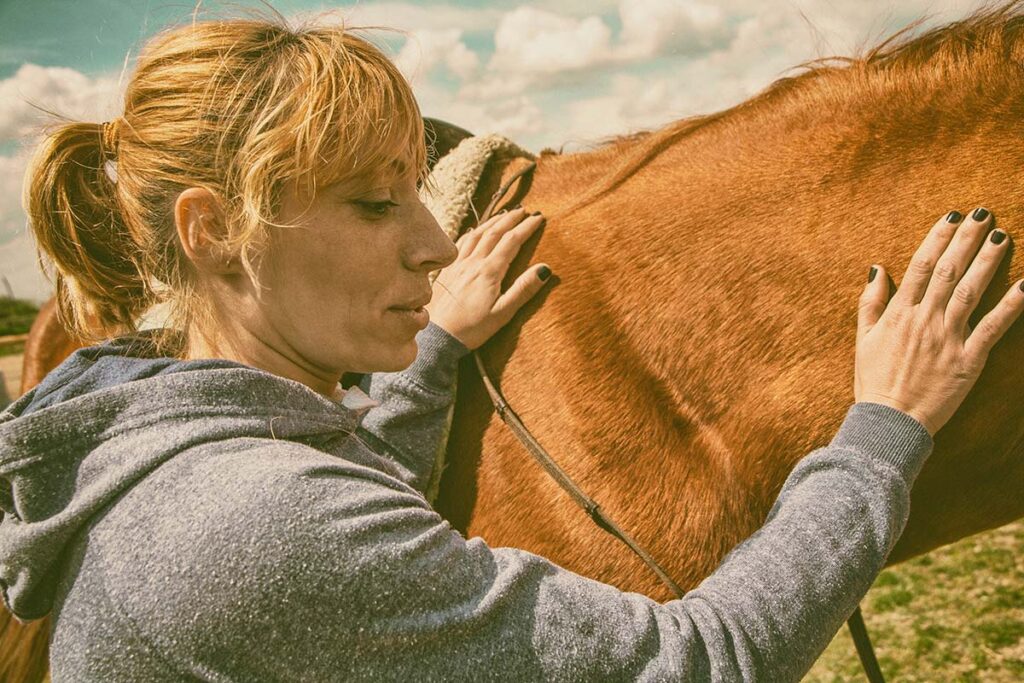The term “therapy” often paints the picture of a person lying on a couch in a dimly-lit room while they talk to someone with a clipboard. However, therapy has changed tremendously as research finds new benefits in alternative therapy. Equine therapy is a relatively new therapy that offers people in recovery from addiction and those managing their mental an opportunity to learn new skills. The benefits of equine therapy can even outweigh those of traditional therapy for some people.
The Ranch Tennessee provides people with mental health and substance use problems the opportunity to heal through experiential therapies in a safe environment. Get started in our equine therapy program by calling us today at 1.844.876.7680.
What Is Horse Therapy in Rehab?
Horse therapy is one of the many experiential therapies that are effective in treating addiction. Experiential therapy is any type of therapy that uses real-life experiences to promote healing, growth, and change.
Other experiential therapies include adventure therapy, wilderness therapy, and outdoor recreation therapy. Equine therapy, also known as horse-assisted therapy, is a form of experiential therapy that uses horses to facilitate healing.
Horse therapy has been shown to be an effective treatment for addiction and mental health disorders. In fact, some studies have shown that horse therapy can be more effective than traditional talk therapy in treating alcohol dependence.
Horse therapy is a unique and powerful experiential therapy that can help people in recovery from addiction learn how to trust themselves and others, develop new coping skills, and gain insight into their behavior.
Why Does Experiential Therapy Work?
Experiential therapy allows people to address their issues in a safe and non-threatening environment. Experiential therapies also provide an opportunity for people to practice new skills and behaviors in a real-world setting.
Building new skills and behaviors after addiction is vital because:
- Resuming regular activities after addiction can be difficult
- People in early recovery are at a higher risk of relapse
- Developing new coping skills can help people deal with stress and triggers
Horse therapy is particularly effective because it uses the relationship between humans and horses to promote healing. Horses are non-judgmental creatures that can provide an immediate and honest response to the emotions and behaviors of humans.
The Benefits of Equine Therapy in Rehab
Horse therapy can offer several benefits to people in recovery from addiction. Horse therapy can help people in recovery learn how to trust themselves and others, develop new coping skills, and gain insight into their behavior.
Working with horses can also help people in recovery from addiction learn about boundaries, build self-esteem, and improve communication skills. Equine therapy can also provide an opportunity for people in recovery to get outside, exercise, and be around animals.
Horse therapy can be an effective treatment for addiction and mental health disorders. If you or someone you know is struggling with addiction, consider equine therapy as a treatment option.
What to Expect in Equine Therapy
Before starting an equine therapy program, it is important to know what to expect. Equine therapy usually takes place in a group setting. The group will typically meet once a week for an hour or two.
During the session, the therapist will guide the group through a series of exercises with the horses. These exercises may include grooming the horses, leading the horses around, and riding the horses.
The therapist will use the exercises to help the group members learn about themselves and their addictions. They may also use the exercises to help the group members learn new coping skills or gain insight into their behavior.
Horse Therapy in Rehab at The Ranch Tennessee
The Ranch Tennessee is a residential treatment center that offers horse therapy as part of our experiential therapies program. Our horse therapy program is designed to help people in recovery from addiction learn how to trust themselves and others, develop new coping skills, and gain insight into their behavior.


